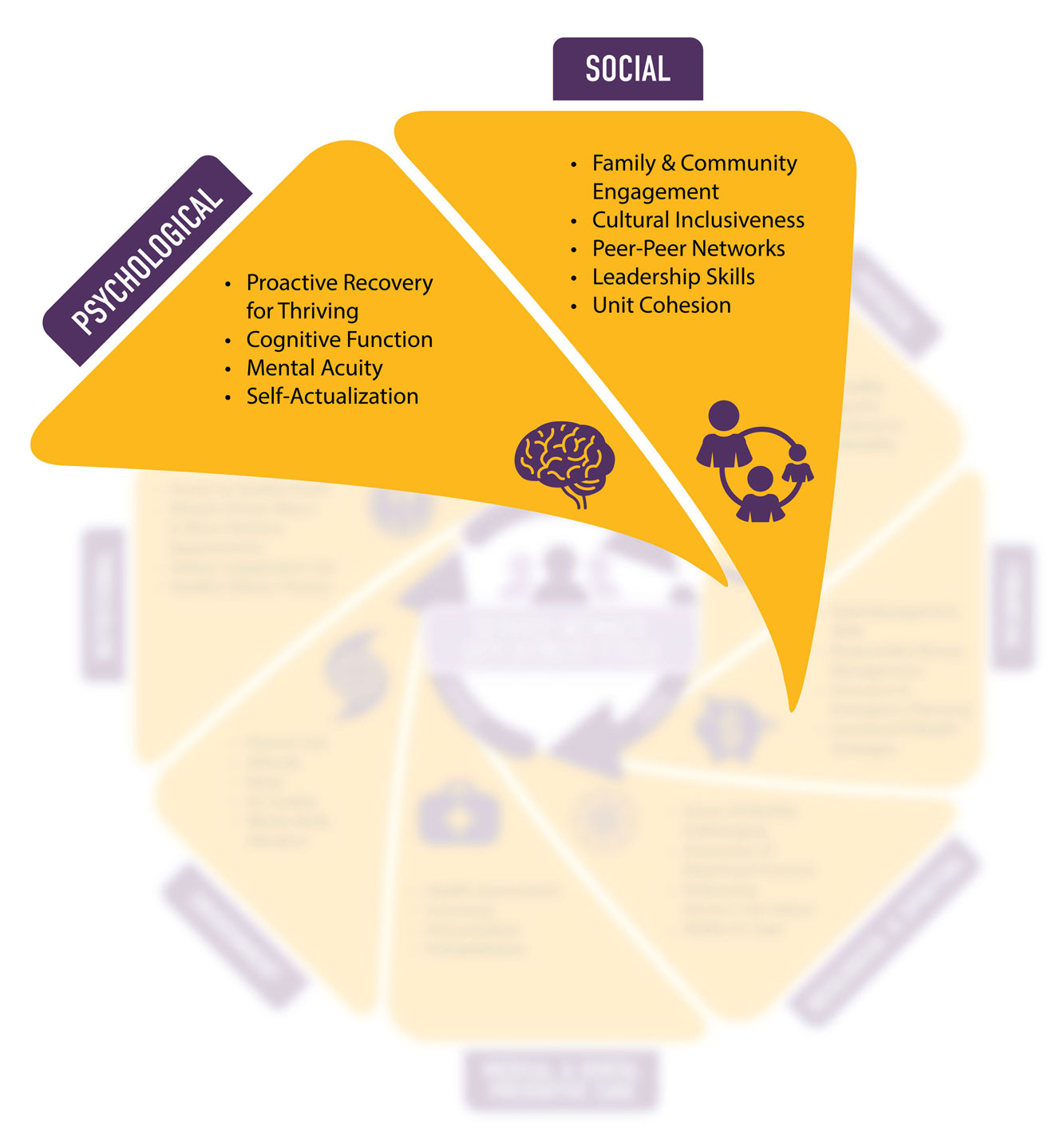Healthy relationships—at home, with friends, on duty, and within your community—are key to achieving Total Force Fitness. Your level of social fitness can affect many other areas of your well-being, particularly your mental health. A strong social-support network, and relationships that provide support rather than stress, can help you navigate the intensity of military life and find performance success.
The basic idea of Total Force Fitness is that all areas (or “domains”) of your health are important to your well-being, and they all impact one another. It’s about expanding how you understand “health” and where you can focus your energy to be the best version of yourself. The social fitness domain is about how your relationships impact your ability to perform well—in general and within other domains of health. For example, do you have relationships with others who support your goals (such as nutrition, weight, or exercise goals)? Do your relationships make you feel connected and emotionally safe? Or are do conflicts tend to distract you from work, duty, or other things? Social fitness affects all 8 domains of Total Force Fitness, but the connection between your mental fitness and your social health is particularly significant.
The connection between mental health and relationships
Social support is about how you interact and communicate with others, what kinds of support you get (help with daily activities, advice, emotional care, and so on), and how happy or satisfied you are with that support. To build a healthy social-support system, you need to foster relationships in all areas of your life—with your partner, children, friends, co-workers and teammates, your leaders and subordinates, and with members of your community. When those bonds are strong, and you feel supported, you’ll be in a better position to optimize stress, sleep well, and focus on the mission or other goals.
And the reverse is true too. When you can use your mental-fitness skills effectively—such as engaging mental flexibility, checking your mindset and biases, and slowing down your emotional reactions so you can focus on optimism and what’s in your control—you’ll have more productive and meaningful interactions with others.
How social support impacts mental health
Social support is important to maintain mental health. People who experience loneliness, a lot of conflict, or unhealthy relationships are at greater risk of depression, post-traumatic stress, or anxiety—or maybe even self-harm or suicide. A lack of relationships can make it more difficult to deal with stress or trauma, or maybe difficult relationships are stressors in and of themselves. For Service Members who deal with mental health issues or invisible injuries, your family and others can play a significant role in your recovery. Also, the challenges you experience throughout military life can impact the mental health of your kids, spouse, or other loved ones. It’s important that you are there to support them as they do for you.
 Relationship stress might cause you to turn to unhealthy habits (such as drinking or drug use) to cope. Or if you’re trying to quit alcohol or drug use, the company you keep plays a significant role in your success. So it’s important to recognize how the people in your life—and how you adjust your behavior when you’re around them—impact your choices. Be prepared with mental fitness and communication skills for times when others might not support your choices.
Relationship stress might cause you to turn to unhealthy habits (such as drinking or drug use) to cope. Or if you’re trying to quit alcohol or drug use, the company you keep plays a significant role in your success. So it’s important to recognize how the people in your life—and how you adjust your behavior when you’re around them—impact your choices. Be prepared with mental fitness and communication skills for times when others might not support your choices.
Finally, a lack of connection can lead to emotional distress, boredom, and general lack of interest in other areas of life, including your job. Healthy relationships buffer against these risks. They enable you to maintain your mental health and, even more, achieve higher levels of mental fitness, performance, and resilience. In addition, social support is important to prevent burnout (mental strain from chronic work stress), which is significant for retention in the military and for overall readiness.
 Mental Fitness Strategy: Practice gratitude to boost both your mental fitness and social fitness. Try using HPRC’s gratitude calendar daily or weekly to help you find the good people and opportunities in your life, remember them, and express gratitude to make those relationships stronger.
Mental Fitness Strategy: Practice gratitude to boost both your mental fitness and social fitness. Try using HPRC’s gratitude calendar daily or weekly to help you find the good people and opportunities in your life, remember them, and express gratitude to make those relationships stronger.
Mental performance and mindset
When it comes to cognitive function and focus, particularly at work and on duty, the relationships you have with others play a big role. Consider first how your relationships at home affect your ability to focus while you’re at work. When you and your partner have a disagreement in the morning, can you be at your best when you get to your job? Or how do you split your mental energy when you’re deployed and you know one of your children is struggling at school? The balance between work and home is a struggle for many, particularly for Service Members whose work requires everyone to be on board. Focusing on communication plans and regulating your own emotions can help you keep your focus where you need it to be.
When it comes to your attention at work, your team relationships matter too. The more you’re able to trust your team and your teammates’ abilities to do their jobs, the better you’ll be able to perform and focus on your own core tasks. And when your mindset assumes your teammates are dependable, competent, and have the team’s best interests in mind, you’ll be better positioned to communicate effectively, build team cohesion, and boost performance together.
 Mental Fitness Strategy: If issues from your relationships might be taking away from your mental focus, try using HPRC’s productive-thinking exercise to self-reflect on whether or not your thoughts, emotions, and actions are productive, and then try one of the exercise’s strategies to boost your mental fitness.
Mental Fitness Strategy: If issues from your relationships might be taking away from your mental focus, try using HPRC’s productive-thinking exercise to self-reflect on whether or not your thoughts, emotions, and actions are productive, and then try one of the exercise’s strategies to boost your mental fitness.
Stress optimization and relationships
Strong relationships are a major asset to help you optimize stress. Healthy relationships build resilience and help you approach challenges with confidence because, at the end of the day, you know you have the support and resources you need. Team cohesion also helps build resilience in the face of combat stress.
But it goes both ways: Building a healthy stress mindset—where you use stress to fuel your performance rather than let it degrade your abilities—can also help you keep your relationships strong. These same skills, which allow you to calm your body’s physical response to stress, can also be applied to your relationships. The stress response triggered by external threats is the same stress response that is activated during emotionally charged conflicts with someone you care about (although the degree of stress is different). Conflict between two people creates the same internal stress, coupled with a flood of negative emotions. The techniques learned to manage combat stress can also help you in your personal relationships.
 Mental Fitness Strategy: Try HPRC’s Create a “Stress Helps Me” Mindset worksheet with a family member or battle buddy to boost your stress mindset and build a stronger relationship. Go through each prompt and discuss your experiences with one another. Help support each other to discover how stress has helped you in the past and how it can be an asset in the future.
Mental Fitness Strategy: Try HPRC’s Create a “Stress Helps Me” Mindset worksheet with a family member or battle buddy to boost your stress mindset and build a stronger relationship. Go through each prompt and discuss your experiences with one another. Help support each other to discover how stress has helped you in the past and how it can be an asset in the future.
Sleep optimization and relationships
Sleep also plays a major role in your mental fitness, well-being, and ability to perform. A lack of sleep can make it difficult to respond to others productively (for example, you might be a less patient or more “snappy” when you’re tired). But your relationships—whether they’re on track or full of discord—can also impact your ability to get rest. Nurturing your relationships can help you get the sleep you need, and getting the sleep you need can make it easier to nurture your relationships.
 Mental Fitness Strategy: If you’re in an intimate relationship, review HPRC’s Sleep Hygiene Self-Check worksheet with your partner to determine what you can do to enhance both your and your partner’s ability to sleep. Also, discuss with your partner if it’s feasible for each of you to do a sleep self-study to find your optimal times and length of sleep, so each of you wakes up energized.
Mental Fitness Strategy: If you’re in an intimate relationship, review HPRC’s Sleep Hygiene Self-Check worksheet with your partner to determine what you can do to enhance both your and your partner’s ability to sleep. Also, discuss with your partner if it’s feasible for each of you to do a sleep self-study to find your optimal times and length of sleep, so each of you wakes up energized.
Bottom line
All areas of Total Force Fitness matter, and all the areas affect one another. The connection between social health and mental fitness is particularly significant, so take some time to think about how your focus, mood, and performance affect your relationships—and vice versa.
Reprinted with permission. Originally published here: https://www.hprc-online.org/social-fitness/relationship-building/how-social-fitness-impacts-mental-fitness
You can also assess your social fitness with a self-check here: https://www.hprc-online.org/social-fitness/relationship-building/hprc-social-fitness-self-check-0